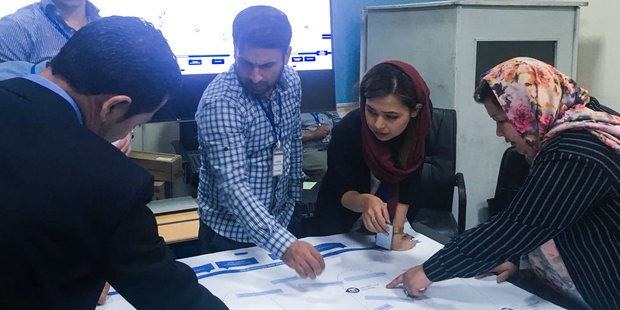The displacement situation in Afghanistan is protracted and complex, with IDPs and repatriated refugees and asylum seekers facing a challenging (re)integration environment. Despite the fact that, in many areas, displaced populations only have limited options for durable solutions, stakeholders have identified the need to develop strategies to reduce these people’s displacement-related vulnerabilities by supporting longer-term planning in, for example, urban areas where many displaced persons reside.
Following up on a support request initiated by the Afghanistan Protection Cluster (APC), the Housing, Land and Property (HLP) Task Force and the Durable Solutions Working Group chaired by the Ministry of Refugees and Repatriation (MoRR), in the past weeks our colleagues Laura Ronkainen and Isis Nunez undertook a scoping mission to Kabul and Jalalabad, in Afghanistan.
The mission aimed to support the Government and international partners in planning for the scope and methodological approach for a durable solutions profiling process, intended to inform the planning of sustainable responses in support of IDPs and returning refugees.

At the beginning of the mission, our colleagues delivered a 2-day training on durable solutions analysis and displacement profiling, sharing experiences from other countries and discussing with the participants the context of Afghanistan.
The training included presentations and group exercises based on the IASC Framework on Durable Solutions for IDPs, frameworks and case studies on durable solutions analysis (as part of the interagency project that developed the Durable Solutions Indicator Library and Analysis Guide, led by the Special Rapporteur on the human rights of IDPs), an introduction to the collaborative approach to displacement profiling, and concepts and tools for engagement with displaced communities in data collection and analysis.
The training brought together 42 participants from national and provincial Government bodies, UN agencies, as well as local and international NGOs to discuss durable solutions and related data challenges and to identify potential ways forward in the context of Afghanistan.
During the mission, JIPS undertook meetings with various stakeholders in order to map and evaluate resources and review existing information sources for displacement data. Existing coordination mechanisms relevant to displacement data and advocacy, policy-making and implementation of durable solutions at national and provincial level were also discussed, and the technical feasibility and parameters of a comprehensive displacement profiling exercise in Jalalabad were assessed.
Together with the MoRR and the HLP Task Force, the JIPS team carried out a joint visit to Jalalabad, in Nangarhar province, to meet with provincial and municipal authorities as well as the Eastern Region Protection Cluster, the UN and NGO partners. The purpose of the visit was to discuss the relevance of the profiling exercise, current challenges related to displacement and durable solutions for IDPs and returnees in Jalalabad, as well as any related data, coordination and capacity needs at the local level.
The mission also focused on outlining a coordination structure and scope of a durable solutions profiling exercise. The intended aim of the profiling process is to create a city-level information instrument to be used to inform decision-making and joint programming across different areas (e.g. services, local economy, transport and mobility, housing etc.), in order to ensure that all interventions, either humanitarian or development-related, take the situation of displaced populations into account, and contribute to the gradual progress towards durable solutions that is so essential. In addition to producing concrete evidence to inform local-level planning through a comprehensive analysis of different population groups, the results of the profiling exercise can also contribute to national-level discussions on strategic approaches to advancing durable solutions.
The profiling process in Jalalabad is planned to start in August 2018, although delays might be expected due to the current safety situation in the country.